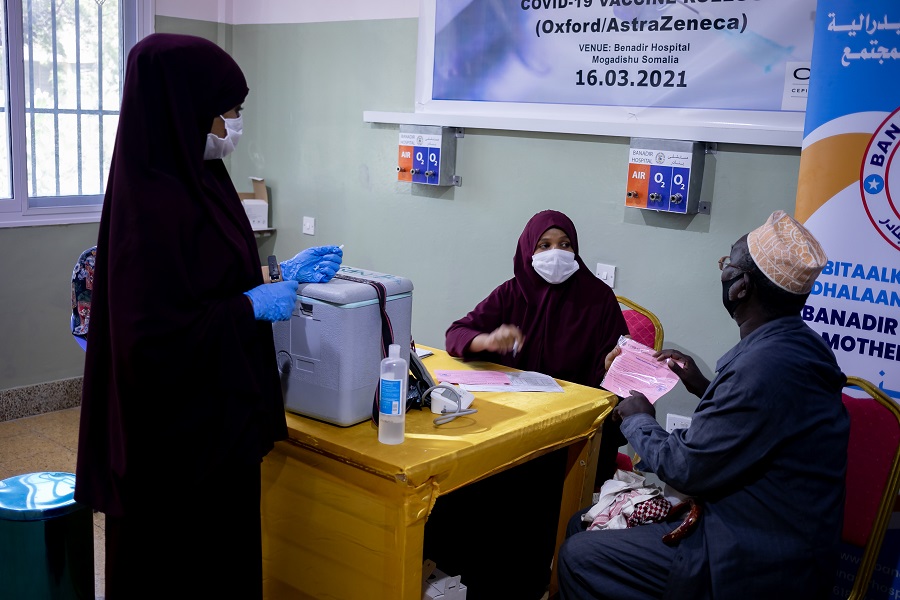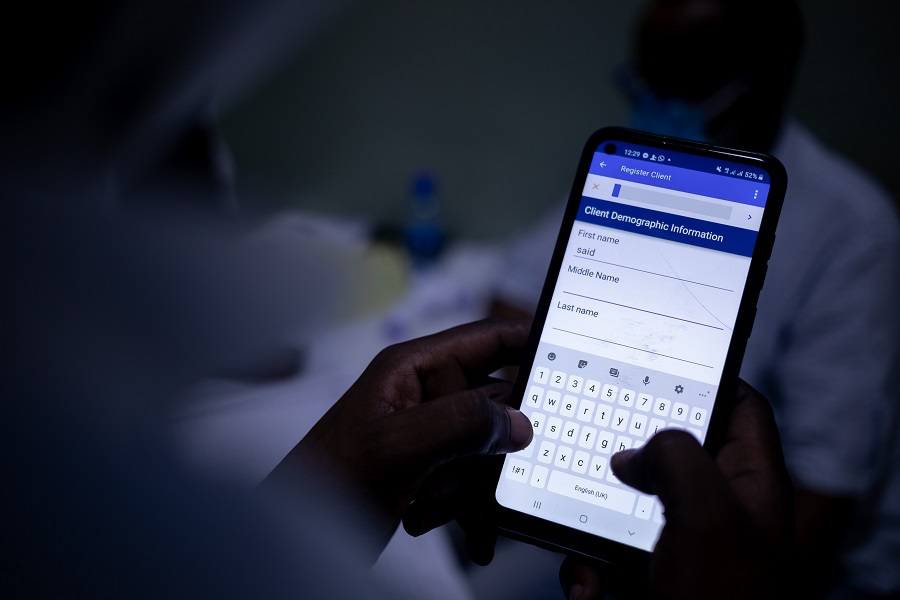 A health care worker briefs an elderly gentleman after he receives his COVID-19 vaccines, Banadir Hospital, March 2021. Photo: WHO
A health care worker briefs an elderly gentleman after he receives his COVID-19 vaccines, Banadir Hospital, March 2021. Photo: WHO
15 September 2021 – Since the day the news of availability of safe and effective COVID-19 vaccines emerged, the Federal Government of Somalia has worked hand in hand with the World Health Organization (WHO) and other key partners to secure vaccines for Somalis.
One year after the first case of COVID-19 was confirmed in Somalia on 15 March 2021, the first consignment of 300 000 AstraZeneca vaccines for COVID-19, received through the COVAX Facility, arrived in Mogadishu. In the following months, frontline workers, including health care workers; the elderly people; and people with chronic health conditions were targeted for vaccination as the first priority groups to receive COVID-19 vaccines.
An insight from a nurse trained to offer vaccinations
As a nurse and being a frontline health worker, 26-year-old Ikram Ahmed Mohamed was among the first to be fully vaccinated against COVID-19.
“I work 6 days a week at the Banadir Hospital – and feel like this is the busiest COVID-19 vaccination site in the country,” says Ikram. “In the beginning, most of the people were elderly, but nowadays, more young people aged between 20 and 40 years are coming to get vaccinated. For some reason though, we have been seeing more men than women taking the vaccines.”
Health care workers like Ikram are trying their very best to dispel rumours and fears. He explains, “Sometimes I do meet people who do not want to get vaccinated. But it is my job to convince them to trust the vaccine. I explain to them the benefits of vaccination and tell them I took it too.”
“Initially, I was a nurse, but before the first COVID-19 vaccines came to Somalia, the Government and WHO trained health professionals like me to administer COVID-19 vaccines safely,” adds Ikram. “Today, I am happy and proud to be a vaccinator, as I feel I am working to combat deadly diseases like COVID-19. I really feel like I am contributing to my community.”
Intensifying the race against time to keep people safe
 Every day trained health care workers, enter key personal and demographic data on every COVID-19 vaccinees into an online database. This helps the Government to track the vaccine recipient for the second dose and monitor any adverse events following vaccination. Photo: WHO
Every day trained health care workers, enter key personal and demographic data on every COVID-19 vaccinees into an online database. This helps the Government to track the vaccine recipient for the second dose and monitor any adverse events following vaccination. Photo: WHO
Along with many other countries around the world, Somalia too is in a race against time to boost the uptake of COVID-19 vaccines and keep communities safe. As the pattern of COVID-19 cases continued to surge and plummet, on 8 August 2021, another shipment of 108 000 doses of AstraZeneca vaccines, donated by the Government of France through the COVAX Facility, landed in Somalia. A week later, the United States of America donated a consignment of 302 400 doses of Johnson & Johnson single-shot vaccines, also supplied through the COVAX Facility.
To protect more Somalis, and boost vaccine uptake, the Ministry of Health and Human Services, in collaboration with WHO, and the United Nations Children’s Fund (UNICEF) and other partners, have introduced various strategies. For instance, they deployed special outreach teams of vaccinators to visit different areas in Banadir during the last round of campaign. The same strategy was used in Somaliland. In addition to searching for people with COVID-19 to offer them the right support, community health workers have been trained to explain the benefits of vaccination and COVID-19 preventive measures.
So far, Somalia has 18 019 confirmed cases of COVID-19 and 982 deaths. As of 12 September 2021, of the 408 000 doses of AstraZeneca, 200 000 doses of Sinopharm and 302 400 doses of Johnson & Johnson doses received by Somalia either through COVAX directly or through donation via the COVAX, 342 063 doses (83%) have been administered, with 116 267 Somalis having been fully vaccinated (0.77%).
Together, the Ministry of Health and Human Services, State ministries, WHO, UNICEF and other partners are regularly meeting to monitor vaccine uptake, manage the distribution of and monitor life-saving supplies, and strengthen strategies to interrupt transmission of the disease.
Acknowledging the crucial role of donors
The response to the COVID-19 outbreak in Somalia has been made possible with the generous support of donors and partners, particularly the European Union (EU) Delegation to Somalia which has provided funding to cover the operational costs for the rollout of COVID-19 vaccinations all across the country. This support has enabled the country to roll out the vaccination against COVID-19 effectively to end the pandemic and help in recovery of the health systems towards building a fairer and healthier world.









